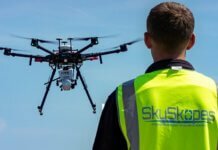 U.S. Sens. John Hoeven, R-N.D., and Cory Booker, D-N.J. – enthusiastic proponents of the unmanned aircraft systems (UAS) industry – recently introduced legislation to accelerate the commercial industry in the U.S. Called the Commercial UAS Modernization Act of 2015, the bipartisan bill was also created with the intention of bringing all parties into a more cohesive unit, according to Hoeven.
U.S. Sens. John Hoeven, R-N.D., and Cory Booker, D-N.J. – enthusiastic proponents of the unmanned aircraft systems (UAS) industry – recently introduced legislation to accelerate the commercial industry in the U.S. Called the Commercial UAS Modernization Act of 2015, the bipartisan bill was also created with the intention of bringing all parties into a more cohesive unit, according to Hoeven.
In an interview with Unmanned Aerial Online, Hoeven says the legislation ‘brings everybody together’: the Federal Aviation Administration (FAA), the six FAA-designated test sites and the entire commercial industry. “That kind of coordination is needed,” he explains.
According to a release from the senators, the act features four main components: “basic guidelines” for operations, a “reasonable framework” for registration, the creation of an FAA deputy associate administrator, and close collaboration with the test sites.
Hoeven – who says he has been advocating for UAS for as long as 10 years, back when he became governor of North Dakota – had been working on the concept of the bill in a “general way” before the FAA came out with its proposed rules in February but began constructing it “in earnest” with Booker shortly after. But until the FAA releases the final rules, he explains, the industry needs a way to move forward in the interim.
“We have companies that want to do research and development (R&D) and advance unmanned aircraft, but they could end up having to wait two years,” he says.
“The idea is really twofold: one, to get going now, under the proposed rule, in a way that works for people who want to develop unmanned aircraft and that works for the FAA,” he explains, “and two, to coordinate with the test sites.”
Under the legislation, these operators would fly without an airworthiness certificate but in accordance with many of the parameters prescribed in the FAA’s proposed rules, including under 500 feet in altitude, within the visual line-of-sight and in the daytime.
Had the proposed rules been different, Hoeven notes, he may have considered altering the legislation in some ways, but the concept would have remained the same: “How do we get going now, rather than having to wait two years?” he says, adding that he already has met with FAA Administrator Michael Huerta to discuss the bill and is planning future meetings.
The legislation, Hoeven explains, is about “empowering the FAA to move forward” in publishing the final rule and working with the UAS industry while doing so.
Part of this empowerment would be the appointment of an FAA deputy associate administrator, who would essentially be a “point person” for getting UAS integrated into national airspace, he says. He or she would also be responsible for “resolving barriers,” the act says, of UAS operations that were not included in the proposed rules, such as those of beyond visual line-of-sight.
The deputy associate administrator would also “spearhead” the effort, he says, of developing effective sense-and-avoid technology, which is vital for manned and unmanned aircraft integration, he explains.
That’s where the test sites come in; they would provide an outlet in which entities can conduct this and other types of R&D and can obtain certification for both the aircraft and the pilot, according to Hoeven.
“The bill provides timelines for the FAA, working with the test sites, to set up those types of certifications,” he explains.
According to the text of the act, the deputy associate administrator, along with Huerta, would have 30 days after the bill is enacted to set forth these “procedures for registering small unmanned aircraft.” The act also states that a commercial UAS operator would need to have liability insurance and pass both flight and knowledge tests.
These operators would then “fly in accordance with the proposed rule, rather than waiting until it gets finalized,” he says.
According to the senator, these authorized operations would span all sectors of the commercial industry: agriculture, utilities, public safety, deliveries and more.
“This [legislation] is really designed to help the businesses that want to do R&D – that want to get going, that have the applications – get moving,” he notes. Otherwise, these entities are “forced to go offshore” to other countries where their operations are authorized, he warns. “And we don’t want that.”
So, would the Commercial UAS Modernization Act of 2015 put the U.S. on a path to be the leader in unmanned aviation? “Absolutely,” the senator says. “That’s exactly what we’re doing: We’re making sure other countries do not get ahead of us.”
Part of achieving this, Hoeven says, is garnering support of the general public, as well, by alleviating safety and privacy concerns for the technology – which is exactly what the bill aims to do, he says. “Safety and privacy are very important issues that are included [in the legislation] – and need to be.”
In turn, the legislation could bring “broad-based support for unmanned aviation – not just in the industry but across the whole public,” he explains, tying back in the idea of coordination amongst all parties.
So far, the act has gained “tremendous feedback from throughout the industry,” the senator says. Groups that have already spoken out in support of the legislation include the Small UAV Coalition, the Association for Unmanned Vehicle Systems International (AUVSI) and the Consumer Electronics Association (CEA).
Brian Wynne, president and CEO of AUVSI, says in a statement that the bill “elevates UAS as a national priority,” while CEA says the bill “recognizes the need to make the most of what could be a $1 billion technology market.” The Small UAV Coalition believes the legislation “would allow the small UAS industry to soar.”
According to Sen. Hoeven, UAS are not only the “future of aviation” but also a “huge part of our future.”
Thus, he says, “We need to grab hold and make sure that we are leading the way and doing it in a safe and solid way, respecting privacy, and in a way that garners public support – because [UAS] will have such a big impact.”









